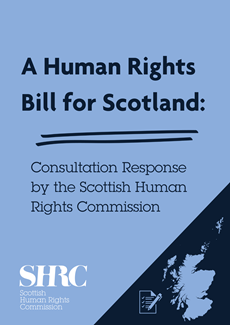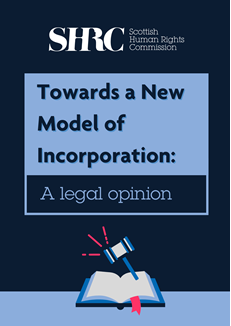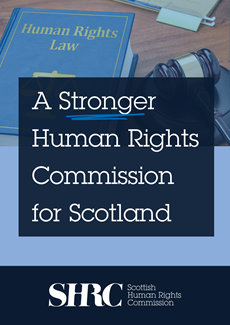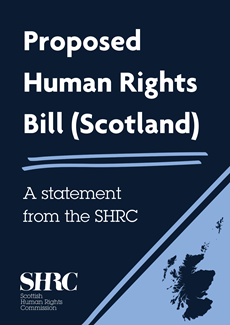All human rights are universal, indivisible, interdependent and interrelated.
Vienna Declaration and Programme of Action
What is Incorporation?
Incorporation is a legal process which brings UN rights treaties directly into Scotland’s own laws and this means courts in Scotland could enforce them.
The Scottish Government has proposed a new human rights law which would put more rights protections in Scots law.
Human Rights Bill for Scotland
We have been calling for stronger protections for human rights in Scotland for more than a decade.
In September 2022, we held an information session on the legal framework the Commission believes is vital to fully embed economic, social and cultural rights in Scots Law, through the proposed new Human Rights Bill for Scotland. Read the Executive Summary and full report Building A New Human Rights Framework for Scotland.
The Scottish Government launched a consultation on a new Human Rights Bill for Scotland in 2023. In October 2023, we set out our position on the proposed Human Rights Bill in a series of three reports called the ‘Incorporation Series’ including a statement.
The Scottish Government’s proposed Bill will incorporate four international human rights treaties directly into Scots law: those covering economic, social and cultural rights, disabled people’s rights, rights of black and ethnic minority people, and women’s rights. It includes a right to a healthy environment, and an equality clause to ensure equal access to the rights contained within the Bill. It will also include specific rights for older people and LGBT+ people.
The Bill is due to be laid before the Scottish Parliament for MSPs to consider in 2023-24. Read more on the Human Rights Bill on our News page.
Our Incorporation Series
In October 2023, we published a series of papers on Incorporation.
- ‘Towards a Model of Incorporation – Legal Opinion’ including the expert advice on human rights treaties from Prof Aileen McHarg and legal opinion of James Mure KC.
- ‘A Stronger Human Rights Commission for Scotland’.
- Human Rights Bill consultation response
- Our statement on the proposed Human Rights Bill.
All Our Rights in Law
The Commission worked with the Human Rights Consortium Scotland to gather views from people and communities across Scotland about how a new human rights law should work.
That evidence was shared with the National Taskforce on Human Rights Leadership and published in a separate report.
Report: Models of Incorporation
In November 2018, the Commission published a new report into models of incorporating international human rights standards into law, authored by Dr Katie Boyle, Associate Professor of Law at the University of Stirling.
The report, Models of Incorporation and Justiciability for Economic, Social and Cultural Rights, highlights that people in Scotland have limited recourse to human rights laws when it comes to realising their economic, social and cultural rights. This accountability gap affects people's rights to an adequate standard of living, health, housing, food and social security, among others.
Dr Boyle's report details how countries around the world, from Germany and Sweden to South Africa and Argentina, have stronger laws and stronger accountability processes for economic, social and cultural rights than exist in Scotland. Around 65 countries globally, including 12 in Europe, explicitly enshrine these rights in their constitutions, while others such as Finland also build in parliamentary scrutiny of whether they are being implemented.
The report demonstrates the opportunity for Scotland to learn from these systems, building on its existing laws and legal remedies as well as parliamentary processes to better protect a broader range of human rights.
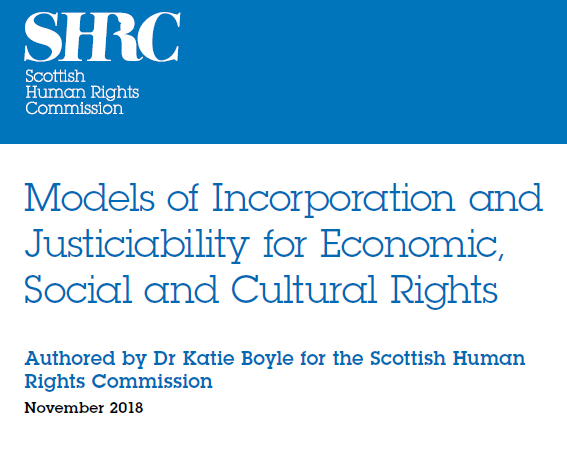
Strengthening Human Rights Law
The Human Rights Act has had a significant positive impact on people across the UK in many areas, and has been an essential catalyst in encouraging and promoting a human rights culture in the design and delivery of services across Scotland. However, certain rights, such as economic, social, and cultural rights, are currently not protected under the Human Rights Act. These rights, of equal importance, are all interrelated and interconnected, and are instrumental in achieving a fairer and more just society.
The Commission has been calling for all human rights, particularly economic, social and cultural rights, to be enforceable in Scotland for over a decade. A new and comprehensive human rights law will provide the opportunity for Scotland to build a human rights culture that puts people’s voices and rights at its heart. It’s an opportunity to both build human rights into decision making and to secure better access to justice when things go wrong.
Incorporation is the process of making international human rights laws (called treaties or conventions) part of the law of a country. This process is particularly important in countries, such as the UK, were international laws cannot be applied directly by duty-bearers or judges.
Incorporation enhances accountability for human rights obligations, allowing people to hold duty-bearers accountable for their actions and omissions.
The International Covenant on Economic, Social and Cultural Rights is an international human rights treaty which, since 1976, the UK is bound to comply with.
ICESCR recognises that everyone, regardless of their race, colour, sex, language, religion, political or other opinion, national or social origin, property, birth or other status, have a basic set of fundamental human rights that are necessary to live a dignified life that is free from fear and want.
Among others, ICESCR guarantees the following rights:
- The right to work
- The right to social security
- The right to adequate food
- The right to clothing
- The right to adequate housing
- The right to health
- The right to education,
- The right to take part in cultural life
The Convention on the Elimination of Discrimination against Women is an international human rights treaty that aims to ensure gender equality and further eliminate discrimination against women. Since 1986 the UK has been bound to the obligations set forth in this international agreement.
CEDAW clarifies what discrimination against women is, by defining it as "...any distinction, exclusion or restriction made on the basis of sex which has the effect or purpose of impairing or nullifying the recognition, enjoyment or exercise by women, irrespective of their marital status, on a basis of equality of men and women, of human rights and fundamental freedoms in the political, economic, social, cultural, civil or any other field."
CEDAW spells out in detail the human rights to equality and non-discrimination for women, and identifies the obligations and actions that must be taken to achieve this. CEDAW aims to guarantee women's equal access to, and equal opportunities in, political and public life, which includes, among others:
- The right to vote and to stand for election
- The right to education
- The right to health
- The right to work, including the right to the same employment opportunities and equal remuneration
- The right to social security
- The right to family benefits
- The right to bank loans, mortgages and other forms of financial credit
- The right to participate in recreational activities, sports and all aspects of cultural life.
The Convention on the Rights of Persons with Disabilities is an international human rights treaty. It makes it clear that disabled people have the same rights as non-disabled people and should not be seen or treated as mere recipients of welfare. The Convention sets out what should be done to break down the barriers that prevent disabled people from realising all of their human rights. The UK has been bound to the obligations in CRPD since 2009.
CRPD defines persons with disabilities as ‘those who have long-term physical, mental, intellectual or sensory impairments which in interaction with various barriers may hinder their full and effective participation in society on an equal basis with others.’
Although the Convention does not create new human rights, it does clarify what certain fundamental rights actually mean in the context of disability. It also clarifies what these rights mean for specific groups, such as children with disabilities. Additionally, the CRPD places obligations on governments to take active steps to make sure people with disabilities can enjoy their human rights.
The International Convention on the Elimination of Racial Discrimination is an international human rights treaty that aims to eliminate all forms of racial discrimination and to promote understanding amongst all races. Since 1969 the UK has been bound to the obligations it contains.
CERD clarifies that racial discrimination is “any distinction, exclusion, restriction or preference based on race, colour, descent, or national or ethnic origin which has the purpose or effect of nullifying or impairing the recognition, enjoyment or exercise, on an equal footing, of human rights and fundamental freedoms in the political, economic, social, cultural or any other field of public life.”
CERD places clear obligations to pursue by all appropriate means and without delay a policy of eliminating racial discrimination in all its forms, in particular:
- Eradicating racial hatred and incitement to hatred
- Combatting prejudices which lead to racial discrimination
- Guaranteeing the enjoyment of civil, political, economic, social and cultural rights without discrimination on grounds of race, colour, or national or ethnic origin
A right to a healthy environment is currently not recognised as a universal human rights in any international law treaty. It is, however, recognised in some regional human rights instruments and in many countries across the globe.
This right recognised that everyone should benefit from healthy ecosystems that sustain human health, well-being and children’s development and enable their full potential. The right t is considered a precondition for the realisation of other human rights including rights to life, food, health and an adequate standard of living.
The Taskforce recommends the UN treaties on economic social and cultural rights, women’s rights, disabled people’s rights and the rights of black and ethnic minority people are all incorporated into Scots law. It also recommends a right to healthy environment, as well as rights of older people and LGBTI people are included in a new statutory framework.
The report has 30 recommendations in total which relate to both the content of a new human rights law as well as well as it should be developed and effectively implemented.


